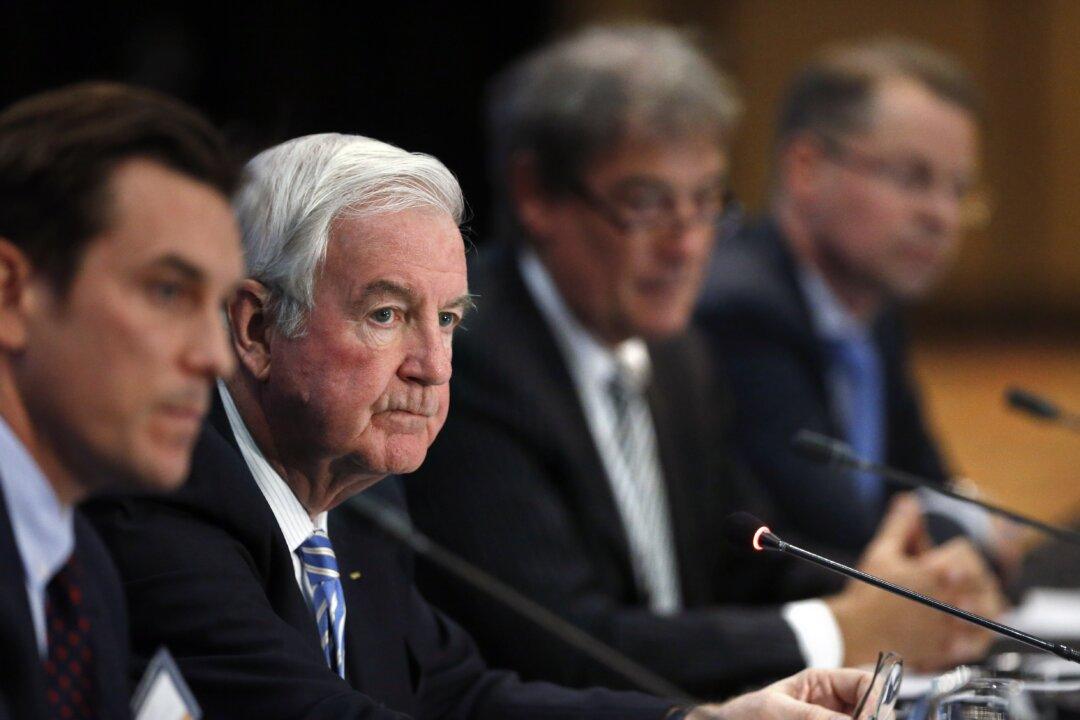LONDON—As the clock ticks down to the opening ceremony in Rio de Janeiro, international Olympic leaders are facing a seminal moment.
With the credibility of the fight against doping on the line and the image of the Olympic movement at stake, the IOC will hold a crucial meeting Sunday to consider whether to ban Russia entirely from the Rio Games because of systematic, state-sponsored cheating.
Short of a blanket ban, the International Olympic Committee could leave it to individual sports federations to decide on a case-by-case basis whether to allow Russian athletes in their events.
The doping crisis represents one of the Olympic movement’s biggest challenges since the boycott era of the 1980s, and how it plays out may well define Thomas Bach’s IOC presidency.
The IOC’s ruling 15-member executive board will meet via teleconference to weigh the unprecedented step of excluding Russia as a whole from the games. Bach and others have spoken of a need to balance “individual justice” versus “collective punishment.”
Time is of the essence, with the games set to open in Rio on Aug. 5.
Russia’s track and field athletes have already been banned by the IAAF, the sport’s governing body, following allegations of state-directed doping — a decision that was upheld Thursday by the Court of Arbitration for Sport.
Calls for a complete ban on Russia have intensified since Monday when Richard McLaren, a Canadian lawyer commissioned by the World Anti-Doping Agency, issued a report accusing Russia’s sports ministry of overseeing a vast doping program of its Olympic athletes.
McLaren’s investigation, based heavily on evidence from former Moscow doping lab director Grigory Rodchenkov, affirmed allegations of brazen manipulation of Russian urine samples at the 2014 Winter Games in Sochi, but also found that state-backed doping had involved 28 summer and winter sports from 2011 to 2015.
Bach said the findings showed a “shocking and unprecedented attack on the integrity of sports and on the Olympic Games” and declared the IOC “will not hesitate to take the toughest sanctions available against any individual or organization implicated.”
Russia also faces a possible ban from the Paralympic Games. Citing evidence in McLaren’s report of doping among Russian Paralympic athletes, the International Paralympic Committee said Friday it will decide next month whether to exclude the country from the Sept. 7-18 event in Rio.
The decision for the IOC is loaded with geopolitical ramifications.
Never has a country been kicked out the Olympics for doping violations. And Vladimir Putin’s Russia is a sports powerhouse, a huge country seeking to reaffirm its status on the world stage, and a major player in the Olympic movement. Many international Olympic officials and federation leaders have close ties to Russia, which has portrayed the exclusion of its track athletes and calls for a complete ban as part of a political, Western-led campaign.
Putin, citing the U.S. and Soviet-led boycotts of the 1980 and 1984 Games, said the Olympic movement “could once again find itself on the brink of a division.”
Former Soviet leader Mikhail Gorbachev wrote an open letter to Bach on Friday to plead against a blanket ban.
“I am worried and deeply upset by the possibility that in the case of a ban on Russian athletes competing in the Olympics, the innocent will be punished along with the guilty,” Gorbachev wrote. “For me the principle of collective punishment is unacceptable.”
Bach and other Olympic officials have repeatedly cited the difference between collective and individual punishment.
“It is obvious,” Bach said last week, “that you cannot punish a badminton player for infringement of rules or manipulation by an official or a lab director in the Winter Games.”





